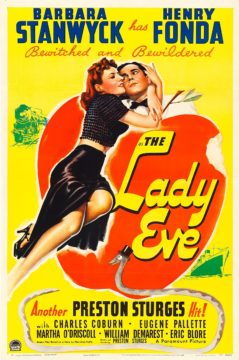Rachel Syme at The New Yorker:
 Klawans, like many before him, notes the echoes of Sturges’s life in his work: the juxtaposition of bohemians and stern squares, the fluency in both American vernacular and European argot, the linking of slapstick and hypocrisy. But he also wants to make this reading “wobble a bit,” and he peers between every snappy line for cultural references, Biblical allegories, political sympathies, and philosophies about love and suffering. A Sturges film, Klawans believes, is more than just its witty banter: “One of the chief distractions from thinking your way through the films is their most universally admired trait: the dialogue.”
Klawans, like many before him, notes the echoes of Sturges’s life in his work: the juxtaposition of bohemians and stern squares, the fluency in both American vernacular and European argot, the linking of slapstick and hypocrisy. But he also wants to make this reading “wobble a bit,” and he peers between every snappy line for cultural references, Biblical allegories, political sympathies, and philosophies about love and suffering. A Sturges film, Klawans believes, is more than just its witty banter: “One of the chief distractions from thinking your way through the films is their most universally admired trait: the dialogue.”
This is a compelling idea, but it misses what makes Sturges’s films so fascinating. His rat-a-tat scripts aren’t running cover for some hidden meaning; they are the meaning. His characters make sense because they slip the yoke of explanation.
more here.
